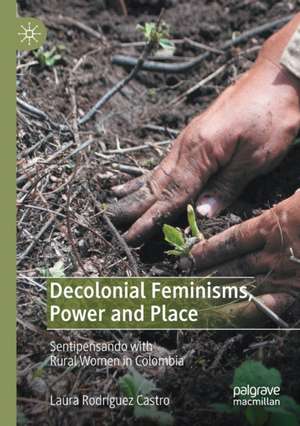Decolonial Feminisms, Power and Place: Sentipensando with Rural Women in Colombia
Autor Laura Rodríguez Castroen Limba Engleză Paperback – 16 dec 2021
| Toate formatele și edițiile | Preț | Express |
|---|---|---|
| Paperback (1) | 568.96 lei 6-8 săpt. | |
| Springer International Publishing – 16 dec 2021 | 568.96 lei 6-8 săpt. | |
| Hardback (1) | 574.10 lei 6-8 săpt. | |
| Springer International Publishing – 15 dec 2020 | 574.10 lei 6-8 săpt. |
Preț: 568.96 lei
Preț vechi: 669.36 lei
-15% Nou
Puncte Express: 853
Preț estimativ în valută:
108.92€ • 112.02$ • 90.36£
108.92€ • 112.02$ • 90.36£
Carte tipărită la comandă
Livrare economică 20 februarie-06 martie
Preluare comenzi: 021 569.72.76
Specificații
ISBN-13: 9783030594428
ISBN-10: 3030594424
Pagini: 208
Ilustrații: XIII, 208 p. 9 illus. in color.
Dimensiuni: 148 x 210 mm
Greutate: 0.27 kg
Ediția:1st ed. 2021
Editura: Springer International Publishing
Colecția Palgrave Macmillan
Locul publicării:Cham, Switzerland
ISBN-10: 3030594424
Pagini: 208
Ilustrații: XIII, 208 p. 9 illus. in color.
Dimensiuni: 148 x 210 mm
Greutate: 0.27 kg
Ediția:1st ed. 2021
Editura: Springer International Publishing
Colecția Palgrave Macmillan
Locul publicării:Cham, Switzerland
Cuprins
1. Introduction: Colonial Feminisms and the Colonial Matrix of Power.- 2. Decolonial Feminisms: Place, Territory and the Body-land.- 3. Sentipensando and Unlearning.- 4. Politics of Place from the Home and the Vereda.- 5. Violences in the Territories Bodies-lands.- 6. Territorio Cuerpo-tierra and Colombian Women’s Organised Struggles.- 7. Conclusion:Towards a Compromiso Sentipensante.
Recenzii
“The book is clearly structured to help the reader follow her process and decolonial praxis … . For those committed to the exploration of decolonial, anti-racism and feminist insurgencies, the book provides several tools and methodological choices … . Rodríguez Castro work is a valuable contribution to the research on rural Latin America … . Her feeling-thinking commitment inspires and provides possibilities of decolonizing the academic world from the very beginning of our place and reflexibility.” (Giovana Possignolo, KULT_online - Review Journal for the Study of Culture, Issue 64, December, 2021)
“An incredibly timely and relevant academic contribution to studies about women’s organization in moments of ongoing violence in Colombia … . offers important insights about gender, place, and culture, particularly as these are related to the ways in which we engage in feminist research. … The book feels honest in a way that is rare in the world of academia. The reader is invited to go behind the scenes and join Rodriguez Castro on her own journey of feeling-thinking, of sentipensando.” (Julia Margaret Zulver, Gender, Place & Culture, June 1, 2021)
“An incredibly timely and relevant academic contribution to studies about women’s organization in moments of ongoing violence in Colombia … . offers important insights about gender, place, and culture, particularly as these are related to the ways in which we engage in feminist research. … The book feels honest in a way that is rare in the world of academia. The reader is invited to go behind the scenes and join Rodriguez Castro on her own journey of feeling-thinking, of sentipensando.” (Julia Margaret Zulver, Gender, Place & Culture, June 1, 2021)
Notă biografică
Laura Rodriguez Castro is a Resident Adjunct Research Fellow at the Griffith Centre for Social and Cultural Research, Griffith University, Australia.
Textul de pe ultima copertă
This book draws on participatory ethnographic research to understand how rural Colombian women work to dismantle the coloniality of power. It critically examines the ways in which colonial feminisms have homogenized the "category of woman,” ignoring the intersecting relationship of class, race, and gender, thereby excluding the voices of “subaltern women” and upholding existing power structures. Supplementing that analysis are testimonials from rural Colombian women who speak about their struggles for sovereignty and against territorial, sexual, and racialized violence enacted upon their land and their bodies. By documenting the stories of rural women and centering their voices, this book seeks to dismantle the coloniality of power and gender, and narrate and imagine decolonial feminist worlds. Scholars in gender studies, rural studies, and post-colonial studies will find this work of interest.
Caracteristici
Engages with decolonial feminisms as a process that is alive and active, emphasising the openness of identities and the entanglement of ways of thinking Addresses decolonial praxis through exploring the author's personal and reflexive stance, and a commitment to unlearn in order to learn other worlds Present rural women’s struggles as enacting other worlds where violences against territories and body-lands are confronted
